by Lisa Cooke | Jun 26, 2017 | 01 What's New, African-American, Interviewing, Oral History
Learning about your African-American family history starts with asking questions, which can sometimes be challenging. Expert Angela Walton-Raji shares tips on talking to your relatives to uncover your family’s stories and heritage.
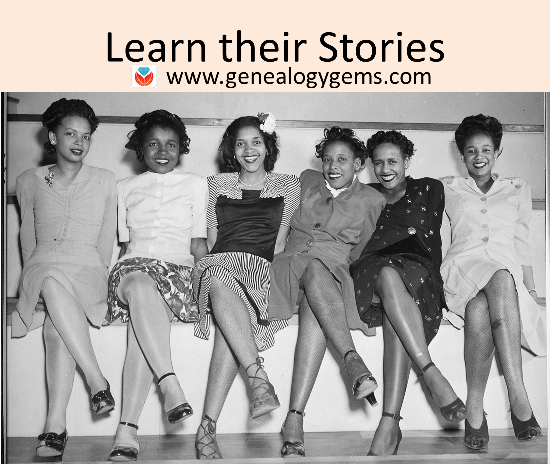 All of our relatives have unique stories. Like these young ladies at a Naval Air Station spring formal dance in Seattle, Washington, in 1944. (Click on the picture to learn more about it.)
All of our relatives have unique stories. Like these young ladies at a Naval Air Station spring formal dance in Seattle, Washington, in 1944. (Click on the picture to learn more about it.)
 Many African-American families share particular types of memories and experiences–for better or for worse–from having lived in the United States. Recently genealogy expert Angela Walton-Raji joined Lisa Louise Cooke on the Genealogy Gems Podcast episode 201 to share tips about researching these stories.
Many African-American families share particular types of memories and experiences–for better or for worse–from having lived in the United States. Recently genealogy expert Angela Walton-Raji joined Lisa Louise Cooke on the Genealogy Gems Podcast episode 201 to share tips about researching these stories.
She especially talked about the importance of interviewing elders, and shared several questions she suggested asking. These will help you learn more about your relative’s own life and other family experiences with the Civil Rights movement, migration, and military service. These questions also delve deeper into passed-down family memories that may help you trace your family history back to the era of slavery.
What to ask in African-American oral history interviews
1. Do you know of anyone in the family who was born a slave? (If old enough: as a child, did you know anyone personally who was born a slave?)
2. Who was the oldest person that you remember when you were a child? And did that person ever talk about anyone who may have been enslaved?
3. What do you know about where the family was from? (Were we always from Georgia, or was there a time when we came from another place? Why did we move? Who remembers that journey?) These questions may help you trace your family during the Great Migration.
4. Were you (or other relatives) involved in the Civil Rights movement, in the Garvey era, with the Freedom Riders, or other important events in your lifetime? What kinds of things did you see?
5. Who in the family participated in the military (in World War II, World War I, or the Spanish-American War)? FYI: African-American military units through the mid-20th century were still referred to as Buffalo soldiers. (In the interview, Angela mentioned the Triple Nickel, a unit of all-black World War II paratroopers.
“If you just drop a couple of key words you might jar their memory and get an amazing narrative to come out.” -Angela Walton-Raji
More African American Genealogy Gems
 A Slave Birth Record is among the Touching Heirlooms in This Exhibit
A Slave Birth Record is among the Touching Heirlooms in This Exhibit
The Colored Farmer’s Alliance: Learning the History Behind their Stories
Finding Your Free People of Color
by Lisa Cooke | Dec 13, 2015 | 01 What's New, Interviewing, Memory Lane, Oral History, Research Skills
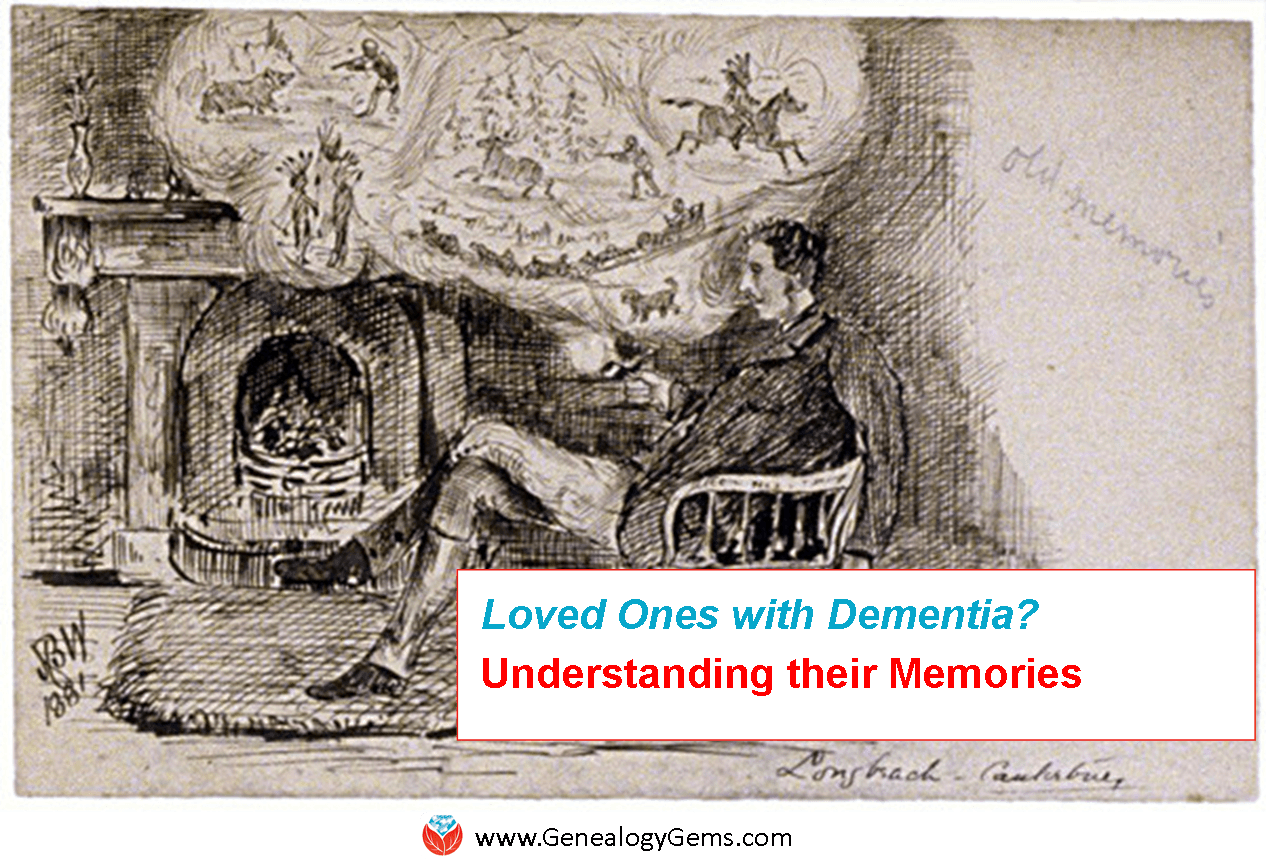
“Old Memories,” by H. Bullock Webster, 1881, via Wikimedia Commons.
When a loved one suffers from dementia or Alzheimer’s, it can be difficult to gather their memories–or to understand how “real” the memories are. Lisa gathered some great advice from an expert!
Many of us have (or will have) loved ones who Alzheimer’s or dementia and memory loss. When they start to become memory-impaired, can we still gather and preserve any of their memories?
Lisa Louise Cooke posed this question in a special interview with Kathy Hawkins, a therapist and Master Trainer with Timeslips Creative Storytelling. Kathy explains that it depends on how advanced their condition is. Meanwhile, we can definitely do some things to improve the experience of asking memory-impaired loved ones about the past. For example:
- When asking questions about the past, don’t use the phrase, “Do you remember?”Ask instead questions like “who, what, where,”….etc. People may shut down when they feel like they’re being given a memory test. So don’t put that kind of pressure on them.
- Your tone of voice and overall approach are so important. Don’t be sing-songy or condescending. Treat them like an adult.
- The emotional integrity of someone’s story is still often intact, even with memory-impairment. Meaning, the emotion attached to a memory or a person will likely be real. But the chronology or details may get confused with other similar events that were also true. Whenever possible, verify facts (especially dates) with other sources.
- Don’t make every conversation (or even most of them) about what they remember (or don’t). Be interested in who they are now: their thoughts and creativity.
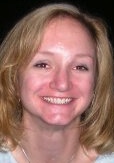 You can listen to Lisa’s entire interview with Kathy Hawkins in the free Genealogy Gems Podcast episode 186. Kathy also shared some information about the organization she works with, Timeslips Creative Storytelling. Click here to see a pdf with some creative storytelling and arts materials created by TimeSlips.
You can listen to Lisa’s entire interview with Kathy Hawkins in the free Genealogy Gems Podcast episode 186. Kathy also shared some information about the organization she works with, Timeslips Creative Storytelling. Click here to see a pdf with some creative storytelling and arts materials created by TimeSlips.
More Family Memories Tips from Genealogy Gems

Is there someone to whom you should send this article? Thank you for sharing it via email or social media!
by Lisa Cooke | Dec 10, 2015 | 01 What's New, Adoption, Genealogy Gems Podcast, Memory Lane
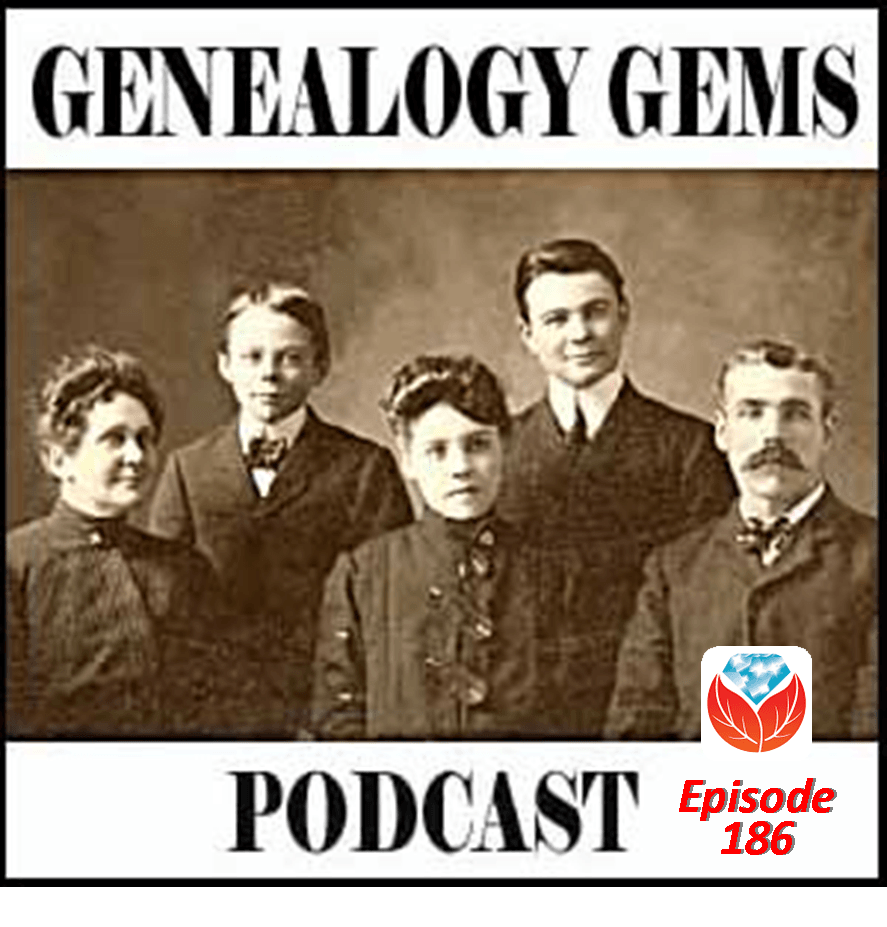 Inspire your holiday season with tips on interviewing older relatives, using DNA for adoption research and more in the Genealogy Gems Podcast episode 186!
Inspire your holiday season with tips on interviewing older relatives, using DNA for adoption research and more in the Genealogy Gems Podcast episode 186!

Kathy Hawkins
The free Genealogy Gems Podcast episode 186 is now live. This month, we celebrate upcoming holiday family time with relatives with a special interview. Guest expert Kathy Hawkins shares suggestions and encouragement about capturing memories from our oldest relatives. I especially appreciate her insights about understanding the memories of those who suffer from dementia and Alzheimer’s.
Also in this episode, our resident genetic genealogy expert, Diahan Southard, offers her thanks for DNA connections that are helping her (and others) fill holes left by adoption in her family. Don’t miss her stories!
You’ll also hear about:
- a great new resource from MyHeritage for connecting with other researchers,
- family history poetry from two of our Gems listeners,
- letters from the Gems mailbox and
- an excerpt from our new Genealogy Gems Book Club interview, which will appear in full later this month in the next Genealogy Gems Premium podcast.
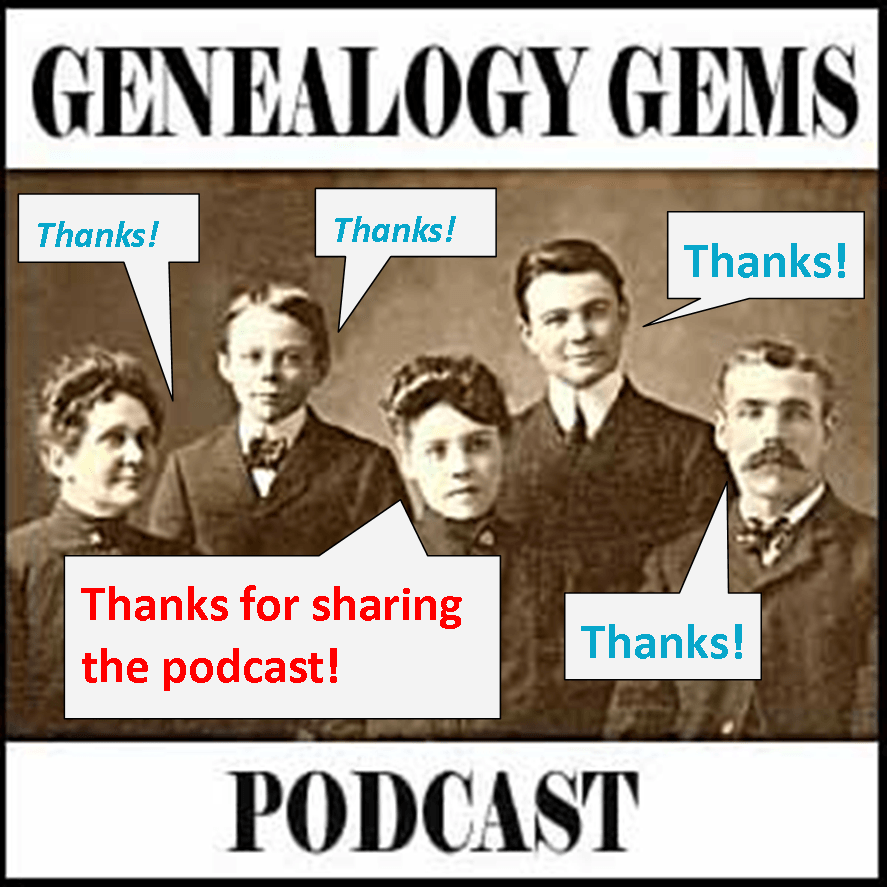 Click here to listen to Genealogy Gems Podcast Episode 186! If you enjoy it, thank you for sharing it with your friends and family by email and through your social media channels. We appreciate it when you help us spread the word about the free Genealogy Gems podcast and website!
Click here to listen to Genealogy Gems Podcast Episode 186! If you enjoy it, thank you for sharing it with your friends and family by email and through your social media channels. We appreciate it when you help us spread the word about the free Genealogy Gems podcast and website!
by Lisa Cooke | Jul 25, 2015 | 01 What's New, Beginner, Heritage Scrapbooking, images, Memory Lane, Oral History, Photographs, Writing Family History
Most of us don’t recall our early years well. How can we tell our life’s story if we don’t remember the first chapter?
I’ve learned to use whatever scraps the past gives me. That’s what I did in a scrapbook I put together a few years ago that reconstructs my early childhood. I realized when looking through this album that I actually cobbled together the past from four different sources, only one of which was my own memory:
 1. The family slide collection. I grew up in the 1970s, when slide photography was all the rage (at least with my dad). Several years ago, I scanned all the slides. My digital copies of the slides became the main narrative for the album.
1. The family slide collection. I grew up in the 1970s, when slide photography was all the rage (at least with my dad). Several years ago, I scanned all the slides. My digital copies of the slides became the main narrative for the album.
2. My parents’ memories, captured in an oral history interview. One day, I got both my parents on the phone at the same time. I asked them to look through their CD of the family slides as I looked through my copy. As we looked at each picture–even the not-so-great ones–I asked what memories surfaced. Different things came to mind for each of them, which was fantastic. They captioned the photos for me, filling in the stories behind the pictures.
 3. My baby book. My parents already had my 11-month old brother by the time I came along. So Mom didn’t have a lot of time to write much down. But there are a few gems in my baby book: my mom’s memories and memorabilia from when I was born. These filled in more gaps in my childhood story.
3. My baby book. My parents already had my 11-month old brother by the time I came along. So Mom didn’t have a lot of time to write much down. But there are a few gems in my baby book: my mom’s memories and memorabilia from when I was born. These filled in more gaps in my childhood story.
 4. My own vague childhood memories. All these pictures and memories jogged loose fragments of my own memories. They are still fragmented; some don’t make much sense or tell a whole story. But taken together with everything else, they help reconstruct my childhood enough that I have a much better sense of it now.
4. My own vague childhood memories. All these pictures and memories jogged loose fragments of my own memories. They are still fragmented; some don’t make much sense or tell a whole story. But taken together with everything else, they help reconstruct my childhood enough that I have a much better sense of it now.
The family historian in me made sure I identified the source of each story in the album. My parents’ memories are tagged as such, as are excerpts from my baby book. I typed up my own memories and put them in my own voice.
Who is living who knows something about your childhood? Parents? Step-parents? Grandparents? Aunts or uncles? Friends of the family? What family artifacts or albums may be in the attic, basement or on a shelf? Ask them to help give you back your own past!
Resources:
Family History for Kids Starts WITH the Kids
 Our free Family History Made Easy podcast offers great episodes on topics related to this post: Lisa covers finding family history at home; interviewing skills, and how to contact long-lost relatives (episodes 13 and 14).
Our free Family History Made Easy podcast offers great episodes on topics related to this post: Lisa covers finding family history at home; interviewing skills, and how to contact long-lost relatives (episodes 13 and 14).
Genealogy Gems Premium members can listen to Premium podcast episode 116, which has an interview with Laura Hedgecock, author of Memories of Me: A Complete Guide to Telling and Sharing the Stories of Your Life. (Click here to learn more about Premium membership.)
by Lisa Cooke | Dec 10, 2014 | 01 What's New, Book Club, History
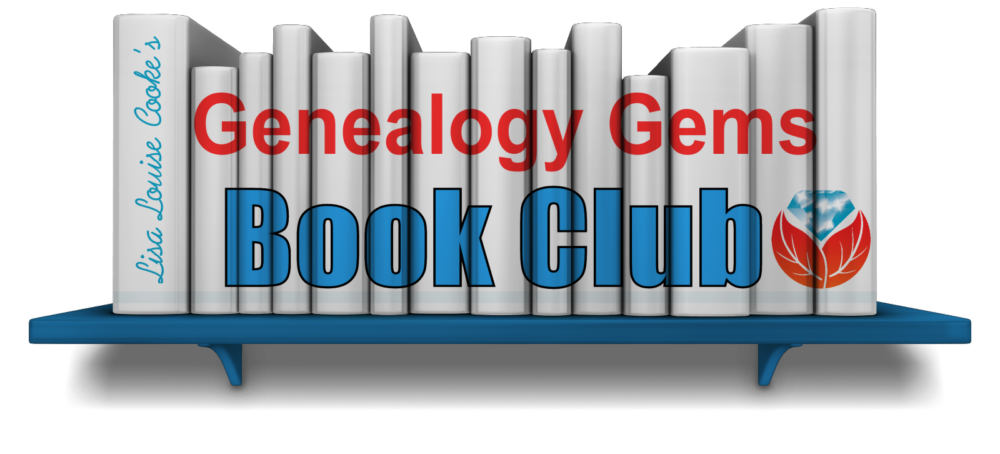 Looking for something fun to read this holiday season? Whether you need reading material for holiday travels or just want to curl up under a blanket at home, here are two great titles I love. I shared these with Lisa in the December episode of the Genealogy Gems podcast–click here to hear our discussion and excerpts!
Looking for something fun to read this holiday season? Whether you need reading material for holiday travels or just want to curl up under a blanket at home, here are two great titles I love. I shared these with Lisa in the December episode of the Genealogy Gems podcast–click here to hear our discussion and excerpts!
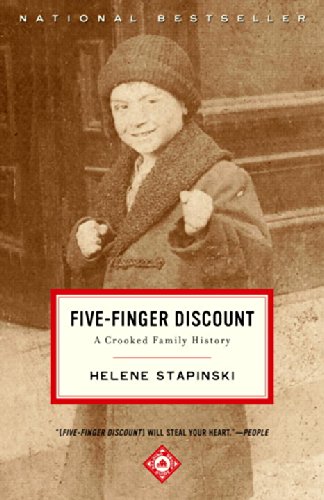 Five-Finger Discount: A Crooked Family History
Five-Finger Discount: A Crooked Family History
by Helene Stapinski is one of my favorite published family histories. The author recounts her family’s upbringing in the context of the notoriously corrupt culture of Jersey City, New Jersey, U.S.A. It’s a page-turner, from the jaw-dropping opening sentence to the author’s final musings about how her own life reflects hand-me-down criminal tendencies. Some of the stories are snickeringly funny and some are sad, and the author keeps just the right distance from the drama. She’s close enough to sympathize with people who are trying to make their way within a culture that rewards dishonesty, greed and violence, yet can laugh at ironies like trying to learn about her grandfather’s petty thefts–when he’s stolen the very newspaper pages about his misdeeds from the library.
 Homemade Biography: How to Collect, Record, and Tell the Life Story of Someone You Love
Homemade Biography: How to Collect, Record, and Tell the Life Story of Someone You Love
This is more than “just” a how-to book for family historians—it’s a story of its own. I re-read it every time I want to be freshly inspired to pursue the stories of my family. New York Times best-selling author and journalist Tom Zoellner weaves stories of his own into fabulous, hard-won advice on interviewing people. He shares insider tips on how to get the best stories out of those we talk to. There’s even a helpful chapter on how to work with the memories of those who have Alzheimer’s!
Tune in next month to learn our next featured book for the first quarter of 2015. Learn more about other books we’ve recommended at the Genealogy Gems Book Club page.
 All of our relatives have unique stories. Like these young ladies at a Naval Air Station spring formal dance in Seattle, Washington, in 1944. (Click on the picture to learn more about it.)
All of our relatives have unique stories. Like these young ladies at a Naval Air Station spring formal dance in Seattle, Washington, in 1944. (Click on the picture to learn more about it.) Many African-American families share particular types of memories and experiences–for better or for worse–from having lived in the United States. Recently genealogy expert Angela Walton-Raji joined Lisa Louise Cooke on the Genealogy Gems Podcast episode 201 to share tips about researching these stories.
Many African-American families share particular types of memories and experiences–for better or for worse–from having lived in the United States. Recently genealogy expert Angela Walton-Raji joined Lisa Louise Cooke on the Genealogy Gems Podcast episode 201 to share tips about researching these stories. A Slave Birth Record is among the Touching Heirlooms in This Exhibit
A Slave Birth Record is among the Touching Heirlooms in This Exhibit



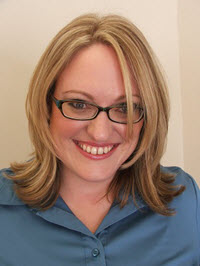








 Five-Finger Discount: A Crooked Family History
Five-Finger Discount: A Crooked Family History



